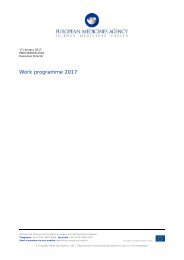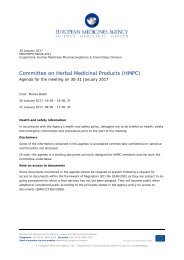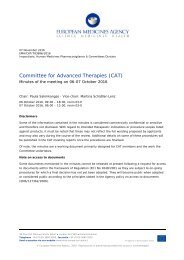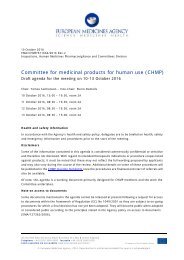Strategic Plan for Food Safety
9789241506281_eng
9789241506281_eng
- No tags were found...
You also want an ePaper? Increase the reach of your titles
YUMPU automatically turns print PDFs into web optimized ePapers that Google loves.
STRATEGIC DIRECTION 2<strong>Strategic</strong> actionsi. Facilitate rapid exchange of food safety in<strong>for</strong>mation among INFOSAN membersand provide technical support to improve response to international foodborneoutbreaks and food safety emergencies23ii.Share technical in<strong>for</strong>mation on foodborne health threats to allow identification ofdata gaps and <strong>for</strong> integrated risk assessment, prevention and controliii. Establish cross-sectoral linkages among human and animal surveillance systems tominimize duplication of monitoring, reporting and delivery systems and facilitateintegrated risk assessmentsiv. Develop an efficient capacity building mechanism to better integrate disease andepidemiological data with laboratory surveillance datav. Establish and foster global frameworks and mechanisms to ensure strategic alignmentand collaboration with other sectors, particularly the agriculture and animalhealth sectorsb) Ensure risk communication and health promotion/education insupport of foodborne disease preventionEffective communication of in<strong>for</strong>mation on risks associated with hazards in food is an essentialand integrated component of the risk analysis process.WHO supports foodborne disease prevention through the development of messages and materialsaimed at assisting Member States in promoting food safety throughout the productionchain and across sectors.There is a need to provide targeted and accurate in<strong>for</strong>mation and health messages in clearand understandable terms, to promote awareness and understanding of a specific food safetyissue. WHO develops tools to assist countries in developing sustainable, preventive educationalprogrammes. As an example of a global health message rooted in scientific evidence, WHO hasdeveloped the Five Keys to Safer <strong>Food</strong> message, which explains the basic food hygiene principlesthat individuals all over the world should know to ensure safe food handling practices toprevent foodborne diseases.There is also recognition that women play a key role in food production and preparation and are








